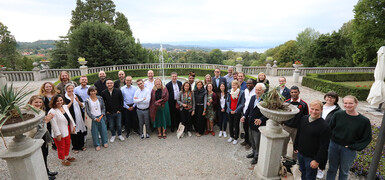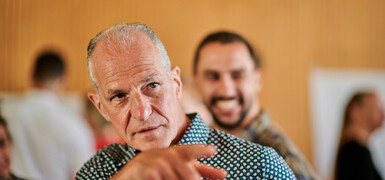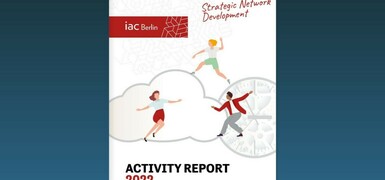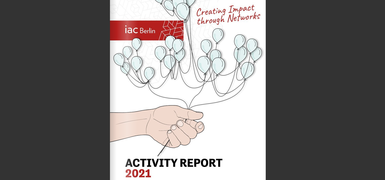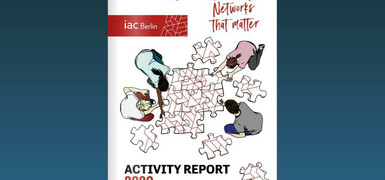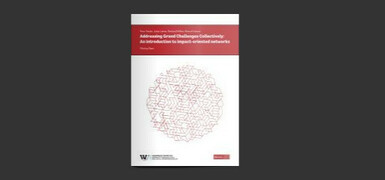
Long-term impact through networks: Bosch Alumni Network
By Bernhard Straub, CEO Robert Bosch Stiftung:
People react very differently to disasters and crises in their immediate vicinity. Some are overwhelmed, others just want to get away from it. Probably, very few people make plans for life after the catastrophe at this moment—like Alexander Shevchenko from Ukraine did. He is an urban planner and member of Bosch Alumni Network (BAN).
Shevchenko started thinking about urban reconstruction just weeks after the Russian attack began. He launched the ReStart Ukraine initiative in Chernihiv, which lies near Belarus and Russia. He and his team wanted to develop a model for how cities throughout the country could be rebuilt after the war. For ReStart Ukraine, the sustainability of reconstruction, such as climate protection in urban planning, was front and center. Simultaneously, Shevchenko's team wanted to broadly involve the city’s residents so that they not only support the redevelopment and the changes in the city but actively participate in shaping them.
To help with the NGO’s initial development and dissemination of its concept, Alexander Shevchenko was looking for sponsors. And he found them—through the Bosch Alumni Network. Still, ReStart Ukraine is not only receiving financial support via the network but contacts to further supporters as well.
Shevchenko is one of several former Robert Bosch Stiftung grantees in
Ukraine who have turned to the network for support in the context of
the war. These people are not seeking personal aid in a moment of
existential thread but support for projects and ideas that benefit their
communities and society in the crisis.
The alumni network plays an important role—particularly in times of crises
This demonstrates the immense value of an alumni network for both parties: former grantees and sponsors. In the spring of 2022, Robert Bosch Stiftung was thinking about how to help the people in Ukraine. It quickly became clear that our alumni network with its many multipliers would play a central role. Through the Bosch Alumni Network, we are connected with more than 8,000 of our formerly funded partners from around 140 countries—in some cases many years after the grant period.
As a result of these sponsorships, which often span decades, we have many direct contacts across the world. These contacts are people who not only have a better understanding of the situation in their country and society but can also make recommendations on where our help is needed most and will have maximum impact. Precisely this in-depth knowledge and the relationships we have built up over many years with former grantees in Ukraine proved highly valuable when we launched a special fund to support Ukrainians last year.
The Bosch Alumni Network is a learning and experimentation space
Numerous organizations, foremost universities, but also companies from around the world have long relied on nurturing relationships with their alumni. With the creation of the Bosch Alumni Network, Robert Bosch Stiftung has taken a significant step beyond simply cultivating a network. It has given relationships with its former grantees a more modern framework through the special design of the network. BAN is a learning and experimentation space which looks toward the future. One of its key offerings is "engineered serendipity." This refers to a controlled, and therefore not entirely random, serendipitous coming together of like-minded people who develop social projects and innovations of all kinds together with others. The network therefore deliberately offers its members plenty of space for exchange and encourages them to take the initiative—a feature that many active members praise in their feedback.
The Bosch Alumni Network now connects people from more than 120 current and former programs. Since its inception, a guiding principle has been and remains the idea that "alumni become partners". This illustrates the conviction that, ideally, alumni continue to be active in their communities even after their sponsorship and become involved in solving social challenges through the network. In this way, they continue the foundation's work and have a positive impact on society.
The success of BAN's unique concept is reflected, among other things, in the high level of engagement in the network. Every fourth member participated in a (digital) Bosch Alumni Network event last year. There are regional and topic-based communities, overarching and mostly free offers by members for fellow members, or calls for joint projects. Former grantees exchange perspectives and opinions, share knowledge, and develop new ideas together. The BAN coordination team, located at the International Alumni Center in Berlin (iac Berlin), a do and think tank for impact networks, supports the self-organization within the network. It provides resources, strengthens networking, makes available potentials as well as best practices visible, and supports members with their work .
The alumni network provides the foundation with new impulses
But membership in the network often means even more. A 2020 evaluation by the Vienna University of Economics and Business found that one in three members concurred that the Bosch Alumni Network had helped them to continue their work despite a difficult economic, social, or political environment. Just like the case of Alexander Shevchenko's urban reconstruction plan. It makes us proud to offer civil society organizations a safe space for their work and simultaneously to see what innovations emerge when former grantees find each other in the network and develop new projects together. The foundation also benefits from this in its work, as we draw new inspiration from alumni and consult them as "critical friends.”
In the future, Robert Bosch Stiftung, together with the Bosch Alumni Network and iac Berlin, wants to bring this experience even more strongly into the field of philanthropy. We aim to address topics such as how foundations can use contacts to their former grantees for the future—as well as how this can flow back into a foundation's work. Just like Alexander Shevchenko's request for support for ReStart Ukraine has led to a lasting relationship with the Robert Bosch Stiftung.
Surely both sides will benefit from this.
About Bernhard Straub
Bernhard Straub is the Chief Executive Officer of Robert Bosch Stiftung. With his consistent commitment to the foundation, he aims to serve the people. Straub holds a degree in industrial engineering, a master’s degree in information systems, and a doctorate in the sociology of knowledge. He joined the Robert Bosch Stiftung after more than 30 years with the Robert Bosch Group, where he held various positions in Germany and abroad.
This article was orginally published in the iac Berlin Activity Report 2022. The entire report is available as free download:



